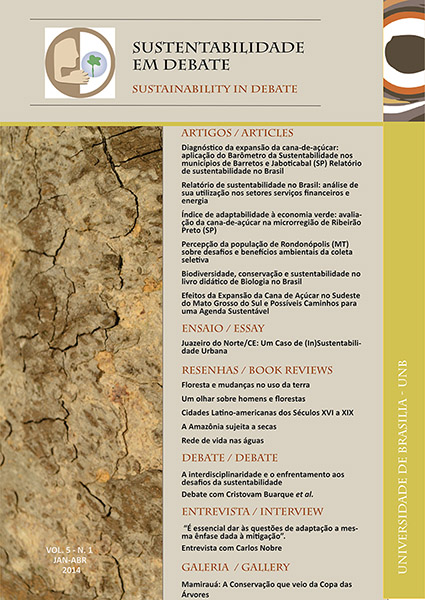Sustainability reporting in Brazil:
an Analysis of the its Use in the Financial and Energy Services Sectors
DOI:
https://doi.org/10.18472/SustDeb.v5n1.2014.9452Keywords:
Sustainability, Sustainability reporting, GRI reporting - Global Reporting InitiativeAbstract
The discussions about the theme sustainability have intensified itself in recent times. The concerns
about environmental and social questions aggregate itself alongside economic concerns. There
was an increase of the companies that communicate the strategies of sustainability through a
sustainability reporting. The model of reporting of the Global Reporting Initiative is considered
one of most utilized in the international context. This study aims to investigate an evolution of
degree of adherence full (GAPIE-GRI) and the degree of effective disclosure (GEE) to the social
performance (labor practices and decent work and human rights) of Brazilian companies in the sectors of financial services, energy and public service energy, which published the GRI sustainability
report between 2007 to 2009. It was observed that the companies had median results in indices
GAPIE-GRI and GEE. The energy sector showed higher rates compared to the financial services
industry. There was an evolution in communication and commitment to effective communication
of social performance.
Downloads
References
corporatesustainability in developing countries. Business Strategy and the
Environment18 (8), 542e556
ALIGLERI, L.; ALIGLERI, L. A.; KRUGLIANSKAS, I.. Gestão socioambiental:
responsabilidade e sustentabilidade do negócio. São Paulo, Atlas, 2009, 245 p.
ARRUDA, G. S.; PEREIRA, B. A. D.. Estado da arte dos estudos sobre responsabilidade
social empresarial (RSE) no Brasil. In: IV Encontro de Estudos em Estratégia da
Associação Nacional de Pós-graduação e Pesquisa em Administração ”“ ANPAD,
Recife, junho, 2009.
ASHLEY, P. A. A Responsabilidade Social nos Negócios: Um Conceito em Construção.
IN:_____ . Ética e Responsabilidade Social dos Negócios. 2. ed. São Paulo: Saraiva,
2002. 340p.
CARVALHO, F. M.. Análise da utilização dos indicadores essenciais da Global
Reporting Initiative nos relatórios sociais em empresas latino-americanas.
Dissertação de Mestrado do programa Pós-graduação em Ciências Contábeis da
Faculdade de Administração e Ciências Contábeis da Universidade Federal do Rio
de Janeiro, 2007.
CARVALHO, F. M.; SIQUEIRA, J. R. M.. Análise da utilização dos indicadores essências
da Global Reporting Initiative nos relatórios sociais e empresas latinos-americanas.
Revista Pensar Contábil. v. 9, n. 28, 2007.
CLARO, P. B. O.; CLARO, D. P.; AMÂNCIO, R.. Entendendo o conceito de
sustentabilidade. Revista da Administração da Universidade de São Paulo. São
Paulo, v. 43, n. 4, p. 289-300, 2008
CMMAD, Comissão Mundial Meio Ambiente e Desenvolvimento. Relatório Nosso
Futuro Comum. Rio de Janeiro. Ed. Fundação Getulio Vargas,1991. 430 p. Disponível
em: <http://pt.scribd.com/doc/12906958/Relatorio-Brundtland-Nosso-Futuro-
Comum-Em-Portugues>. Acesso em: 26-jul-2012.
COSTA, R.; MENICHINI, T.. A multidimensional approach for CSR assessment: the
importance of stakeholder perception. Expert Systems with Applications ”“ Na
International Journal. http://dx.doi.org/10.1016/j.eswa.2012.07.028. 2013.
BARBIERI, J. C.; VASCONCELOS, I. F. G.; ANDREASSI, T.; VANSCONCELOS, F. C..
Inovação e sustentabilidade: novos modelos e proposições. Revistão de
Administração de Empresas, v. 50, n. 2, abr-jun, 2010.
Downloads
Published
How to Cite
Issue
Section
License
SUSTAINABILITY IN DEBATE – Copyright Statement
The submission of original scientific work(s) by the authors, as the copyright holders of the text(s) sent to the journal, under the terms of Law 9.610/98, implies in the concession of copyrights of printed and/or digital publication to the Sustainability in Debate Journal of the article(s) approved for publication purposes, in a single issue of the journal. Furthermore, approved scientific work(s) will be released without any charge, or any kind of copyright reimbursement, through the journal’s website, for reading, printing and/or downloading of the text file, from the date of acceptance for publication purposes. Therefore, the authors, when submitting the article (s) to the journal, and gratuitous assignment of copyrights related to the submitted scientific work, are fully aware that they will not be remunerated for the publication of the article(s) in the journal.
The Sustainability in Debate Journal is licensed under Creative Commons License – Non-Commercial-No-Derivation Attribution (Derivative Work Ban) 3.0 Brazil, aiming at dissemination of scientific knowledge, as indicated on the journal's website, which allows the text to be shared, and be recognized in regards to its authorship and original publication in this journal.
Authors are allowed to sign additional contracts separately, for non-exclusive distribution of the works published in the Sustainability in Debate Journal (for example, in a book chapter), provided that it is expressed the texts were originally published in this journal. Authors are allowed and encouraged to publish and distribute their text online, following publication in Sustainability in Debate (e.g. in institutional repositories or their personal pages). The authors expressly agree to the terms of this Copyright Statement, which will be applied following the submission and publishing by this journal.








